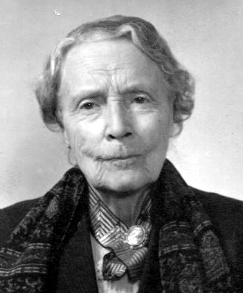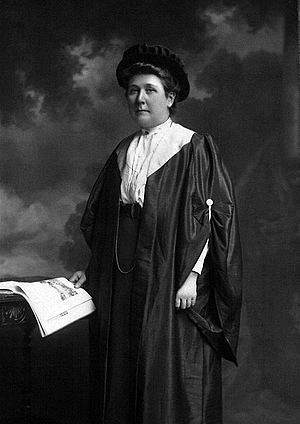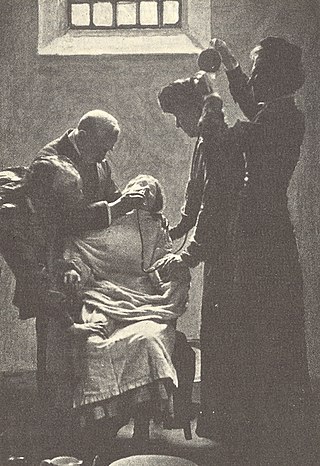Related Research Articles


Frances Mary "Fanny" Parker was a New Zealand-born suffragette who became prominent in the militant wing of the Scottish women's suffrage movement and was repeatedly imprisoned for her actions.

Ethel Agnes Mary Moorhead was a British suffragette and painter and was the first suffragette in Scotland to be forcibly-fed.

Jane "Janie" Allan was a Scottish activist and fundraiser for the suffragette movement of the early 20th century.

Grace Ross Cadell was a Scottish doctor and suffragist, and one of the first group of women to study medicine in Scotland and qualify.

Arabella Scott was a Scottish teacher, suffragette and campaigner. As a member of the Women's Freedom League (WFL) she took a petition to Downing Street in July 1909. She subsequently adopted more militant tactics with the Women's Social and Political Union (WSPU). She was one of a group who attempted arson at Kelso racecourse in May 1913. She was arrested many times and went on hunger strikes when she was sent to jail. Whilst in Perth Prison in 1914, she was force-fed for an extraordinarily long time under the supervision of Dr Hugh Ferguson Watson. She was released under the controversial Cat and Mouse Act. WSPU activism ceased when the First World War began and Scott later emigrated to Australia. She wrote about her experiences in her autobiography A Murky Past.

Elizabeth "Dorothea" Chalmers Smithnée Lyness was a pioneer medical doctor and a militant Scottish suffragette. She was imprisoned for eight months for breaking and entering, and attempted arson, where she went on hunger strike.

Frances Graves aka Frances Gordon was a British suffragette who became prominent in the militant wing of the Scottish women's suffrage movement prior to the First World War and was imprisoned and force-fed for her actions.

Catherine Hogg Blair was a Scottish suffragette, magistrate, founder of the Scottish Women's Rural Institute (SWRI), and member of the Women's Social and Political Union (WSPU). Blair was a passionate campaigner and spokeswoman for rural women, dedicated to doing 'all in her power to further the interests of women'. In 1940, Blair's history of the Scottish Women's Rural Institute Rural Journey: A History of the S.W.R.I. From Cradle to Majority was published, summarising the achievements and goals of the organisation since its inception in 1917. Blair was also a skilled potter, founding Mak'Merry pottery studio in the town of MacMerry, East Lothian.

Ellison Scotland Gibb was a Scottish suffragette and chess player. She was an active member of the Women's Social and Political Union. In 1910, she was appointed as the honorary secretary of the Actresses' Franchise League in Glasgow. She was arrested and imprisoned on several occasions for her militant activity, and confronted both Churchill and Asquith to make the suffrage case. Her chess career included winning the Scottish Ladies Championship in 1907. and acting as President of the Glasgow Ladies Chess Club from 1921

Frances Mary McPhun was a Scottish suffragette who served two months in Holloway prison, and had organised events and processions for women's suffrage in Edinburgh.
Jessie Cunningham Methven was a Scottish campaigner for women's suffrage. She was honorary secretary of the Edinburgh National Society for Women's Suffrage from the mid 1890s until 1906. She subsequently joined the more militant Women's Social and Political Union and described herself as an "independent socialist".

Edith Hudson was a British nurse and suffragette. She was an active member of the Edinburgh branch of the Women's Social and Political Union (WSPU) and was arrested several times for her part in their protests in Scotland and London. She engaged in hunger strikes while in prison and was forcibly fed. She was released after the last of these strikes under the so-called Cat and Mouse Act. Hudson was awarded a Hunger Strike Medal 'for Valour' by the WSPU.

Catherine Isobel Ida Corbett was a British suffragette, one of those imprisoned and awarded the Hunger Strike Medal, for the cause of the Women's Social and Political Union.

The Hunger Strike Medal was a silver medal awarded between August 1909 and 1914 to suffragette prisoners by the leadership of the Women's Social and Political Union (WSPU). During their imprisonment, they went on hunger strike while serving their sentences in the prisons of the United Kingdom for acts of militancy in their campaign for women's suffrage. Many women were force-fed and their individual medals were created to reflect this.

Women's suffrage was the seeking of the right of women to vote in elections. It was carried out by both men and women, it was a very elongated and gruelling campaign that went on for 86 years before the Representation of the People Act 1918 was introduced on 6 February 1918, which provided a few women with the right to vote.

The Shetland Women's Suffrage Association was an organisation involved in campaigning for women’s suffrage, based in Shetland.

The Orcadian Women's Suffrage Association was an organisation involved in campaigning for women’s suffrage, based in Orkney, Scotland.
Muriel Eleanor Scott (1888–1963), was a Scottish suffragette, hunger striker, and protest organiser. Her sister Arabella Scott was force-fed many times, and Muriel Scott led protests about this cruel treatment.
Elizabeth Thomson was a Scottish suffragette and a member of the Edinburgh branch of the Women's Social and Political Union (WSPU). She was arrested for her involvement in WSPU protests in Scotland and London alongside her sister, Agnes. The sisters were involved in the first arson attempt in Scotland as part of the WSPU arson campaign in 1913. Elizabeth was awarded a Hunger Strike Medal 'for valour' by the WSPU.
References
- 1 2 Geddes, JF (2008). "Culpable Complicity: the medical profession and the forcible feeding of suffragettes, 1909–1914". Women's History Review. 17(1):79–94. doi:10.1080/09612020701627977. p82.
- 1 2 3 The Suffragist Disturbances. The Scotsman. Edinburgh. 23 November 1911.
- ↑ 1881 England, Wales & Scotland Census.
- ↑ Crawford, Elizabeth (1999). The Women's Suffrage Movement: A Reference Guide 1866-1928. Routledge.
- ↑ Leneman, Leah (1995). A Guid Cause. Revised edition. Mercat Press. p272.
- ↑ Crawford, Elizabeth (2006). The Women's Suffrage Movement in Britain and Ireland. Routledge. p237.
- ↑ Leneman, Leah (1995). A Guid Cause. Revised edition. Mercat Press. p140-144.
- ↑ Leneman, Leah (1995). A Guid Cause. Revised edition. Mercat Press. p155.